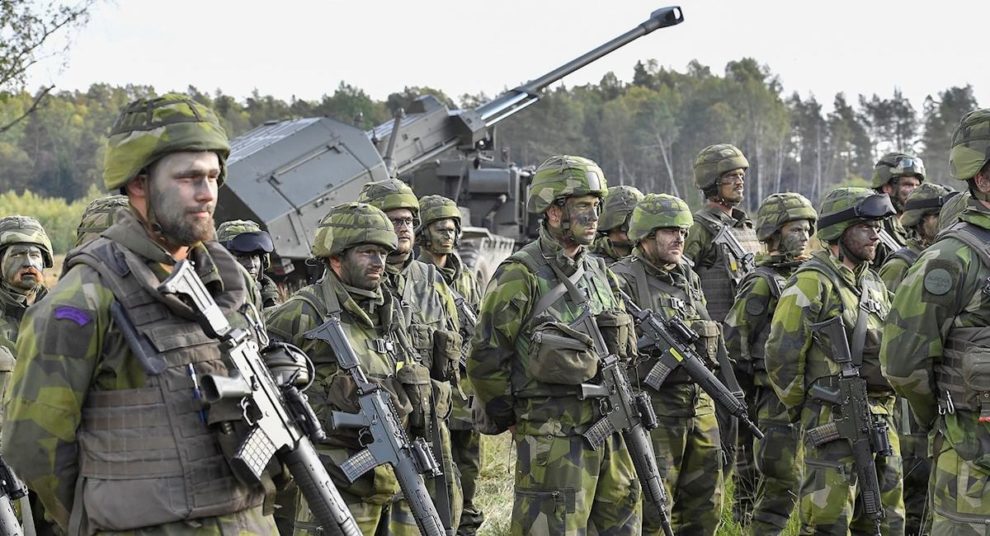Sweden’s militarization process continues to grow. The Scandinavian country wants to recover its military potential at all costs and, therefore, recently approved a large rearmament project with its defense budget increasing dramatically in the coming years. When explaining the reasons behind such measures, the Swedish Defense Minister, Peter Hultqvist, explained that this is due to possible threats to the country, without giving many details about what such threats would be.
In fact, the Swedish and European security situation has deteriorated a lot in recent times. Illegal immigration, the infiltration of terrorists into refugee flows, the internal economic instability generated by the pandemic – which increases social tensions – and Europe’s recent departure from the US protection umbrella are scenarios that raise doubts about the future of security across the continent. In the militarily weaker countries, this fear is even greater, which has led Swedish security and defense experts to demand more government investment in these areas.
Among other things, the new Swedish project predicts that in the next five years the country’s defense budget is expected to grow from 3.44 billion dollars to 10.57 billion dollars. The new budget intends to cover all areas of the defense sector, including improvements both in the military industry and in human resources. Although this new budget is still small before the investments of the main military powers, this represents a major militarization process for Sweden – a country that has been marked by an institutionalized pacifist ideology for decades.
This pacifist ideology for a long time affected the very ability of Swedish strategists to analyze and forecast scenarios. Until recently, something like the possibility of an invasion of Swedish territory was seen as completely unrealistic, being a scenario ignored by prominent experts. Now, however, this scenario is not only seen as a possible reality, but it is also sought to treat it as an imminent hypothesis, immediately creating conditions to face this possible future danger.
In his recent statement on the new budget, the defense minister stressed that the Swedish government is acting on the assumption that the security situation will continue to worsen year after year. This realistic assumption appears to be an excellent guideline for defense and security policies for any country. Although the dangers may seem minor, preparation for crisis events is always necessary. But despite his realism, the minister is wrong when appointing his possible enemies. Hultqvist mentioned Russia as a possible opponent of Sweden in a military conflict, which generated a little diplomatic tension, which may grow in the coming days. Russia’s Ministry of Foreign Affairs official Maria Zakharova declared, in response to Sweden’s legislative initiative, that “anti-Russian phobias” are the result of external pressure on Stockholm, in particular by NATO. It is important to note that the Nordic kingdom regularly conducts exercises with its NATO partners, including exercises in Eastern Europe along Russia’s western borders. Sweden is materially unable to face Russia but adheres to Western plans simply to ensure protection from NATO in the event of a future conflict – where the country would be caught in a crossfire between Russians and Europeans. In the current context, however, is it still profitable for Sweden to adhere to the strategy of the Western military alliance?
NATO, despite being made up of countries from all around the world, is an organization that serves exclusively to Washington’s interests. And, as we can see, Washington’s interests are absolutely uncertain today. Biden’s own election was uncertain, as Trump continued to deny recognition, and this could create a scenario of two “self-proclaimed presidents” for 2021. How can a stabilized and well-defined nation subject itself to the plans of a country in a state of social catastrophe and complete political chaos such as the US? Other countries allied to Washington, such as Germany, France, and Japan, have already noticed the inconsistency in remaining submissive to American plans and have been looking for a path of greater sovereignty – this, certainly, is the most correct path for Sweden.
However, perhaps Sweden is not so submissive to NATO’s plans as it seems to be and is already pursuing its own interests. With Trump, the American role as global police has been diminished, which Biden intends to recover. This means that Biden will also seek to provide greater “protection” to his European allies, which Trump was unable to do. Although the scenario is still chaotic, Biden is the president-elect and will certainly rule his country next year. Given this, will Sweden delay or continue to accelerate its militarization process? If it delays, it will certainly take the position of a submissive nation, with no interests of its own and that only sought to militarize because it had lost the protection of the West; however, if it continues to increase its war potential, it will be looking for a new direction, of greater sovereignty.
Contributed By Lucas Leiroz, a research fellow in international law at the Federal University of Rio de Janeiro.
